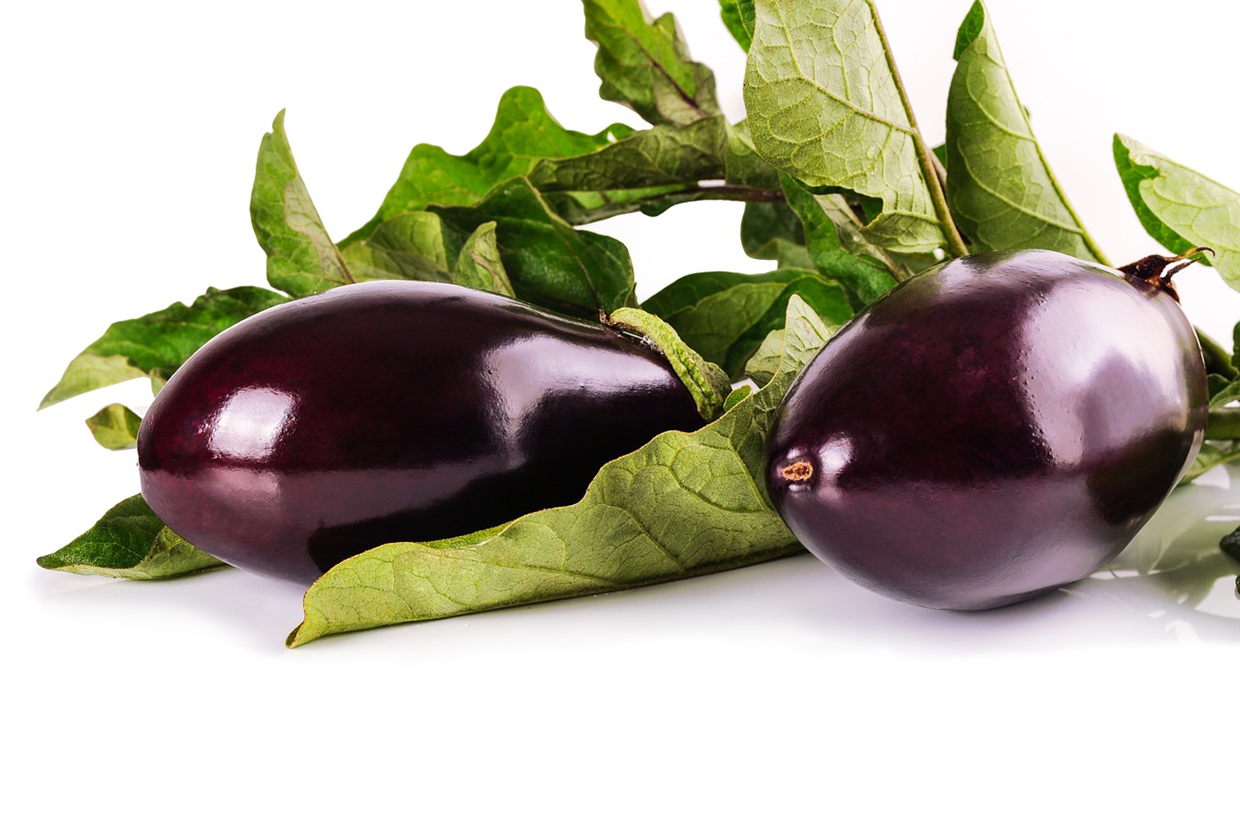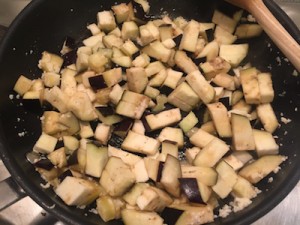
The Dinette Teller – 43. The Purple Leader: Aubergine
Aubergine is an essential ingredient in Italy as well as in many countries around the world. It is excellent for your health and It has special texture and taste. A wonderful ingredient that you can combine in hundreds of different dishes.
The aubergine species belongs to the family Solanum Melongena. It originated in India more than 4000 years ago, as a native plant.

In Italy, aubergines have been used since 400 A.C. They were brought by the Arabians. Nowadays, Italy is one of the biggest producers and traders of this vegetable.
Varieties
The aubergine is a typical summer vegetable, growing until November. In fact, it cannot grow below 12°C.
Aubergines can be distinguished in a wide variety of types, depending on the shape and the colour. The shape can be oval, round, or belonged. The colour white, black, purple, yellow, or green.
Amongst the most renown we can find: “the violet of Florence” round in shape, the “Black Beauty“, with its big fruits as the “Giant of New York“, the “White Egg”, white in colour, the “Larga Morada”, exhibiting a clear colour and darker stripes, and finally the “Aubergine of Rimini”, dark purple in colour and with an elongated shape.

Components & Health Benefits
The aubergines are really low in calories.
These are the main components:
- 92% water,
- 3,4% fibres
- 1% proteins
- 2,3% sugars
- 0,2%fats.
Aubergine is a very good source of dietary fibre. It also contains a good amount of mineral salts, such as Potassium, Phosphorus, Magnesium, Zinc, Iron, Copper, Calcium, Sodium, and Selenium.
Furthermore, they are also a rich source of vitamin A, B1, B2, B3, B5, B6, C, E, K, J. They contain a good amount of beta-carotene and amino acids.
On the other hand, aubergine also contains a toxic substance, called “solanine”, which gives a terrible taste to the aubergine, when eaten raw and can cause toxic symptoms when ingested in large quantities.
8 Reasons to Eat Aubergines
1. Depurative and Re-energizing
Thanks to the high content in water, the aubergine is considered one of the most depurative vegetables. It is therefore strongly recommended for people suffering from gout, arteriosclerosis and urinary tract inflammation. The good amount of minerals gives to the aubergine also the reputation of a re-energizing and re-mineralizing agent, mainly useful in Summer.

2. Low in calories, and enemy of cholesterol
Aubergines contain a very low quantity of fats and no cholesterol. They are high in fibres, and this helps in giving a fullness feeling. For these reasons, aubergines are considered the perfect food for whom who want to lose some weight, and often included in slimming diets.
Also, very low in calories: only 24 per 100grams.
Aubergines also contain some bitter substances, that can be found in the artichoke leaves as well. They contribute in stimulating the bile production and in decreasing the cholesterol and LDL fats levels.

However, due to its thickness and spongy texture, aubergines tend to absorb very easily dressing an seasoning. Therefore, do not use to much oil or fry them because it will neutralize their health properties.
3. Chlorogenic Acid
It is a substance with high antioxidant properties. Its activity gives a great contribution to the reduction of cholesterol in the blood and it hinders the free radicals actions.
4. Digestive Properties and Slightly Laxative
As the most of the vegetables, aubergines have a good amount of fibres. This promotes the peristalsis and the bowel passage of foods. It helps the digestive process and eases the absorption of nutritive substances.
Thanks to their laxative action, it is recommended in case of stipsis.

5. Gluten-free
It can be freely eaten by celiacs!
6. Good for the bone & blood health
The aubergines contain some phenolic compounds that are linked to the reduction of osteoporosis symptoms and to an increase of the bone density. Moreover, thanks to a high content in Iron, Copper and Calcium, this vegetable introduces itself as a very good friend of our bones and a trustworthy allied against anaemia.
7. Good for the Brain
Phytonutrients, antioxidants and vitamins act as beneficial substances for the cognitive function and improve the blood circulation of the brain, with many benefits in terms of memory and cerebral functions. They also act against the free radicals, slowing the ageing process of the nervous tissue.

8. Recommended during pregnancy
The high amount of folic acids makes the aubergines a very recommended food during pregnancy.
In the Kitchen
You can stock and preserve aubergines in the fridge for around 7 days. Afterwards, slice them into cubes and freeze them. It’s recommended to salt the aubergine before cooking to absorb the bitter substances of the vegetables. After this process, the aubergines will taste better!
Lastly, aubergines are very versatile and you can cook them in many ways: oven-baked, fried, steam-cooked, grilled, and so on. You can use them as a side, add it to pasta sauce, or even preserve it in glass jars with Extra Virgin Olive Oil.

If you want to try a very special product made with aubergines, “Cannonata” is a MUST!
Cannonata is a popular and very versatile sauce. A nutritious puréed mix made with vegetables like tomato, artichoke, aubergine and peppers and with a hint of chilli.
How to use:
You can use it to compliment all your recipes Some of our favourite recipes are made with our artisan pasta Strozzapreti tris or Orecchiette.
Heat the sauce slowly in a saucepan, and then mixing it with pasta. It is also great as a sauce for meat or fish dishes, a spread on tarallini, bruschetta or crostini, a sandwich filler, and as a dip for party finger food.
Fantastic in salad dressings, stews, soups, and with scrambled eggs!

Delicious recipes with Cannonata:
We have thousands of delicious recipes waiting to get on your plate.
Have a look to all of them on our blog:




